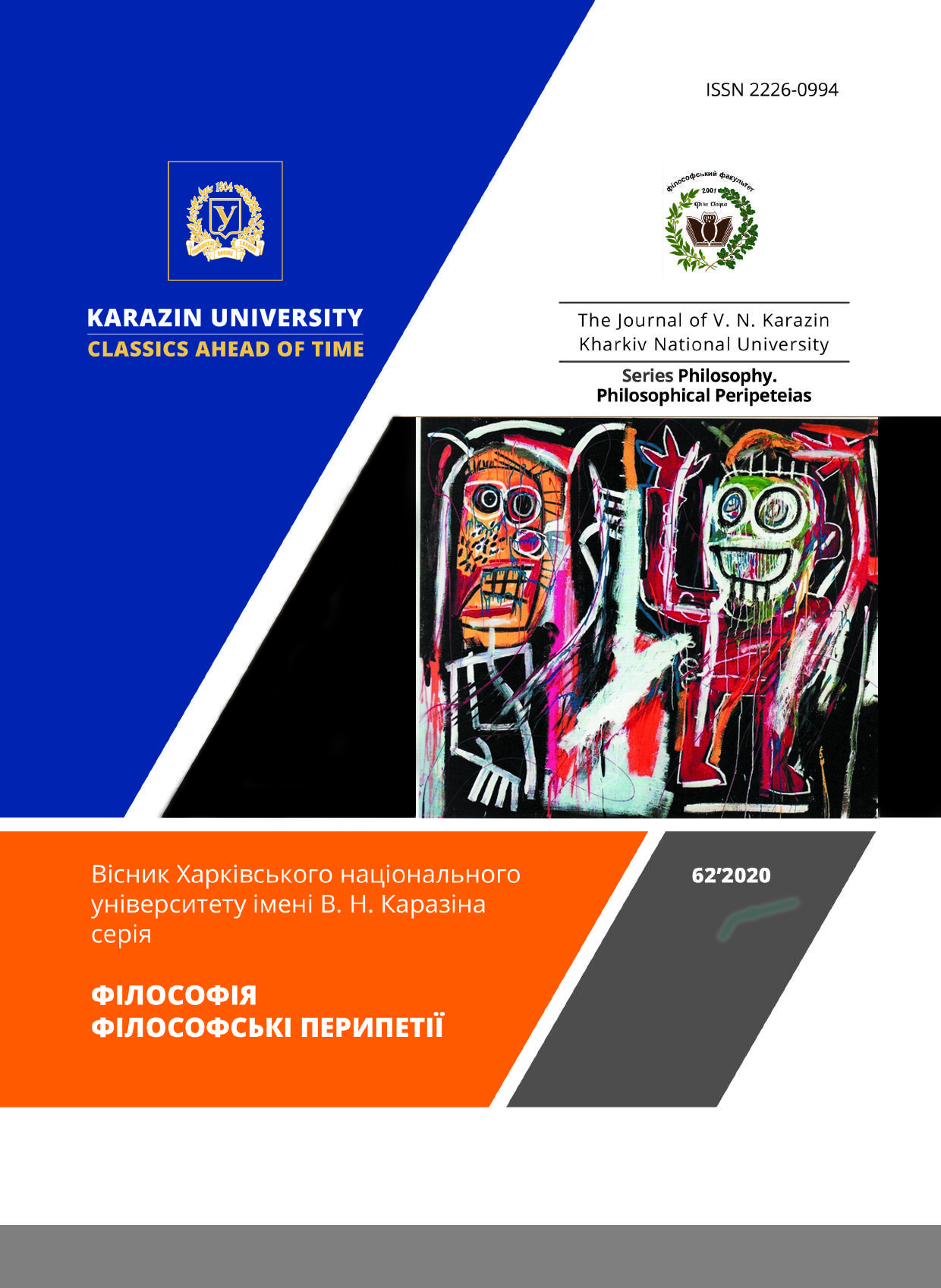PHILOSOPHICAL PRINCIPLES OF THE FORMATION OF A CULTURALLY COMPETENT PERSONALITY
Abstract
The article is devoted to the conceptualization of philosophical principles of the formation of a culturally competent personality. It has been established that these principles are implemented in anthropological, existential, epistemological and axiological planes, which determines the sustainable development of personality. The anthropological context is associated with the understanding of man as a holistic developing system. A culturally competent personality is about a person in culture and for culture. The existential and epistemological contexts outline the place and significance of the Other in the personal formation of I, in shaping its life position in terms of cognitive and behavioral systems of interaction. The axiological context raises the question of the moral and value attitude of I to itself, the world and others like itself.
Culture is defined as an ontological condition for the realization of a culturally competent personality. Emphasis is placed on the human-creating function of culture, its ability to regulate the space of all-unity. The competence component of a person’s personal development is realized in the fact that by learning the cultural codes of interpersonal interaction, constructing himself and the surrounding space, a person is aware of cultural differentiation and organizes his activities according to plurality of human needs, demands and objectives.
The formation of a culturally competent personality takes into account the principle of dialogue. As shown in the article, the dialogical interaction between I and the Other is a factor in the integrity of a person's personal development. Dialogue encodes the space «between» I and the Other; fixes the ontological and epistemological openness of I, its ambivalence towards the Other.
Downloads
References
Aliaiev, G. Е. (2009). Personality in the Relationship «I-You» and «I-We». S. Frank and Philosophy of Dialog. Philosophical Horizons, 22, 3-19. [In Ukrainian].
Andrushchenko, V. P. (2008). Philosophy of Education in the «Margin of Tomorrow». Philosophy of Education, 1-2 (7), 7-14. [In Ukrainian].
Bakhtin, M. M. (1986). Aesthetics of Verbal Creativity. Moscow: Art. (Original work published 1979). [In Russian].
Dilthey, W. (1995). Types of Worldview and their Detectionin Metaphysical Systems. (H. Kotliar & S. Hessen, Trans.). In S. Levit (ed.), Cultural Studies. XX Century: Anthology (pp. 213-255). Moscow: Lawyer. (Original work published 1901). [In Russian].
Ebner, F. (1997). Word and Spiritual Realities. (V. Makhlin, Trans.). In A. Mikhailov (ed.), From I to the Other: Collection of Translations on the Problems of Intersubjectivity, Communication, Dialogue (pp. 28-44). Minsk: Mensk. (Original work published 1921). [In Russian].
Kovalchuk, V. V. (2013). Philosophical Anthropology as a Humanitarian and Scientific Paradigm to Understanding of Human. Scientific Bulletin of Chernivtsi University. Series: Philosophy, 663-664, 58-62. [In Ukrainian].
Krat, Yu. G. (2013). The Phenomenon of «Another» in J.-P. Sartre’s Existential Philosophy. Bulletin of Dnipropetrovsk University. Series: Philosophy, Sociology, Political Science, 2 (23), 161-165. [In Russian].
Melnyk,V. V. (2016). Anthropological Foundations of Culture as the Basis of Human Multi-dimensionality in Terms of the Reconfiguration of the Global Social Space. Humanitarian Bulletin of Zaporizhzhya State Engineering Academy, 65, 186-201. [In Ukrainian].
Panfilov, O. Yu. (2019). Transculturation as a Way to Unity of Modern Ukrainian Society. In O. Panfilov (ed.), Social and Humanitarian Sphere of Ukraine in Modern Discourses (pр. 218-233). Kharkiv: HIFKNTEU. [In Ukrainian].
Plotnikov,N. S. (2000). Life and History. Wilhelm Dilthey’s Fhilosophical Program. Moscow: Intellectual Book House.[In Russian].
Prokopenko, V. V. (2012). Philosophical Paideia and Platon’s Question. Kharkov: Monograph. [In Russian].
Rosin, V. M. (2007). Philosophy of Education: Studies. Moscow: Publishing House of Moscow Psychological and Social Institute; Voronezh: Publishing House of «MODEK».[In Russian].
Safonova, I. O. (2016). Pedagogical Technologies of University International Students’ Cross-cultural Competence Formation on the Basis of Axiological Principles. Spirituality of Personality: Methodology, Theory and Practice, 6, 188-202. [In Ukrainian].
Sartre, J.-P. (2000). Being and Nothing. Experience of phenomenological ontology. (V. Koliadko, Trans.). Moscow: Publishing house «Republic». (Original work published 1943). [In Russian].
Shashkova, L. O. & Zlochevska, M. V. (2011). Dialogue Dimension of Humanitarian Knowledge. Kyiv: Professional. [In Ukrainian].
Sheler, M. (1994). Selected Works. (A. Denezhkin, A. Malinkin & A. Fillipov, Trans.). Moscow: Publishing House «Gnosis». [In Russian].
Vasylchenko, R. V. (2013). Methodological Basis of Researching of Philosophicaliy-educational World Out-look Culture Aspect. Bulletin of Н. S. Skovoroda Kharkiv National Pedagogical University. Series: Philosophy, 40 (1), 231-239. Retrieved from http://nbuv.gov.ua/UJRN/VKhnpu_filos_2013_40(1)__24. [In Ukrainian].
Copyright (c) 2021 Тетяна Заїка

This work is licensed under a Creative Commons Attribution 4.0 International License.
Authors who publish with this journal agree to the following terms:
- Authors retain copyright and grant the journal right of first publication of this work under the terms of a license Creative Commons Attribution License 4.0 International (CC BY 4.0).
- Authors are able to enter into separate, additional contractual arrangements for the non-exclusive distribution of the journal's published version of the work (e.g., post it to an institutional repository or publish it in a book), with an acknowledgement of its initial publication in this journal.
- Authors are permitted and encouraged to post their work online (e.g., in institutional repositories or on their website) prior to and during the submission process, as it can lead to productive exchanges, as well as earlier and greater citation of published work.






3.gif)




